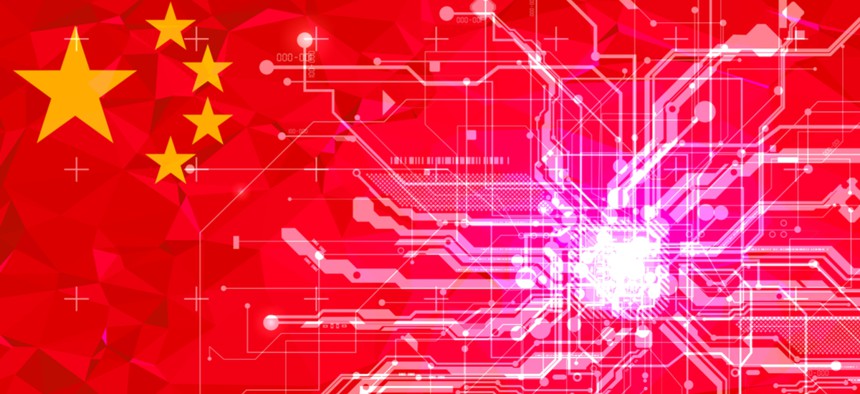China is Using Tech to ‘Reset the Global Balance of Power,’ Experts Tell Congress

vectorsector/Shutterstock.com
And tariffs won’t keep the scales tilted to U.S. interested, they said.
The government needs to diversify and strengthen its efforts to stop China from co-opting the U.S. innovation economy to support its own global ambitions, industry experts told lawmakers on Wednesday.
And tariffs probably aren’t the best way to do it, they said.
“For more than 40 years, the U.S. has encouraged China to develop its own economy and take its place alongside the U.S. as a central and responsible player on the world stage,” said House Oversight IT subcommittee Chairman Will Hurd, R-Texas. “China does not want to join us, they want to replace us. More importantly, China has not been playing fair.”
At the hearing, panelists described the many measures China has taken to protect its domestic tech sector while exploiting foreign countries’ research and development efforts.
The Chinese government views information and communications technology as “the basic metric for future power,” said Dean Cheng, a Heritage Foundation senior research fellow specializing on China. As such, dominance in artificial intelligence, quantum technology, cloud computing and other sectors “presents an opportunity to reset the global balance of power,” he said.
China’s booming tech industry not only presents economic and national security threats to the U.S., witnesses said, but it often comes at the expense of its own citizens.
Companies looking to enter the Chinese market often need to divulge trade secrets, and their user data is often fed into the country’s massive surveillance state, said Sarah Cook, a senior research analyst at Freedom House. She suggested the government reassess its approach to promoting internet freedom in China and impose penalties on companies who are complicit in abuses.
While panelists debated the merits of the tariffs the Trump administration recently imposed on China, they largely agreed the government needs a multi-faceted approach to do any real damage.
“If we’re going to use tariffs … let’s put some thought behind it and not just use them as a blunt instrument,” said Robert Atkinson, president of the Information Technology and Innovation Foundation. He suggested the U.S. team up with global allies to pressure China to drop some of its more nefarious trade practices and limit their global market share.
In recent years, the Chinese government has significantly ramped up its investment in artificial intelligence and quantum computing research, and panelists repeatedly called for the U.S. government do to the same. Cook said the U.S. should also create a long-term strategy for artificial intelligence.
Hurd and subcommittee Ranking Member Robin Kelly, D-Ill., on Tuesday released a report detailing the current state of artificial intelligence in the U.S. and recommending actions to maintain the country’s leadership in the space. The White House on Monday also published a broad national strategy to advance quantum computing, a technology Hurd said will be critical to achieving breakthroughs in general AI.






